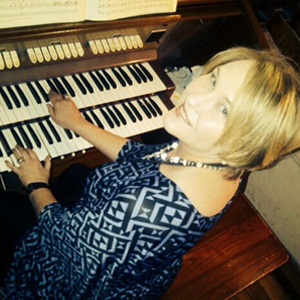
"Harmony!" That’s what Caren Yssel says digital hearing aids have given her – in more ways than one. She literally hears more harmony when she plays the organ. She feels more harmony at home now that she can hear her friends and family. And she senses more harmony in her life without the stress and exhaustion of hearing loss.
“It has been an interesting journey for me,” she says. “It’s like a whole new world has opened up for me. Hearing aids make a huge difference.”
Early hearing problems
Caren, 44, is a qualified general practitioner as well as a musician. She first noticed her hearing loss as a child. "I don’t exactly know when the hearing loss actually started; I know that I always struggled with my stethoscope a bit more than the other medical students, but I thought my anxiety related to my stethoscope was to blame and made it even worse," added Caren.
She ignored it until 2003 when she had her first hearing test. There, an audiologist told her she had mild to moderate sensorineural hearing loss in one ear.
"I was told that nothing could be done about it and I didn’t realise I should have asked about wearing a hearing aid," says Caren. So instead of getting hearing aids she compensated by using her other ear.
That didn’t always work. Caren couldn’t hear through her stethoscope in her job as a doctor. She couldn’t hear her husband from another room. Speaking in groups was tiring and stressful.
By the time she went back to her audiologist in 2012, the hearing test results revealed that her hearing loss had become much worse. She was fitted with two WIDEX CLEAR 220 hearing aids and started to use DEX hearing aid accessories with her cell phone.
That’s when her life changed.
An easier life
Change came almost immediately, starting with her organ playing. Organists choose registrations when they play to make the music come together – and Caren’s choices changed quite dramatically. Before hearing aids she had to tone down the higher pitches to compensate for her hearing loss. She also realised she was playing too loudly.
With hearing aids, Caren says that “suddenly the king of instruments came into balance”. Caren is now also a music teacher at the local music centre.
Caren's career as doctor has also improved including communicating with patients. "As a doctor, communication with patients is much easier. Now they actually ask me to repeat myself (apparently I speak softer now).
Using my stethoscope is still a temporary challenge as there are now digital stethoscopes and I’m currently shopping around for one I can use with my M-DEX," says Caren.
Things changed at home as well. Caren now speaks more softly because she can hear her own voice better.
“And now my friends are the ones asking me to repeat things,” she says. “Sometimes I think they’re the ones who need hearing tests.”
A good look for great sound
Like many people with hearing loss, Caren wondered how hearing aids would look in her ears. But even with short hair she says they are discreet. People who do notice respond by being amazed how such small hearing aids can make such a big difference.
Caren's audiologist warned her that when using the hearing aid for the very first time all the surrounding sounds would be amplified, as the brain would need to learn which sounds to filter out. "My voice sounded like I was speaking through a PA system and when someone opened the tap in their kitchen it sounded like a waterfall!" exclaimed Caren.
Luckily with this hearing aid the frequencies can be programmed individually. "My model had 3 settings I could choose from, depending on specific situations. The “Master” setting is the default and we chose “Comfort” for those very noisy situations and “Audibility Extender” specifically designed to hear those elusive high frequency, soft sounds like the “s and f’s”. This setting, I found out later, was very useful for me as a musician."
For Caren, however, the looks don’t matter so much – it’s the sound that counts.
“When we have hearing loss, it takes a lot of energy just trying to understand what the world is saying,” she says. “Hearing aids take that problem away.”
What is sensorineural hearing loss?
Sensorineural hearing loss is a hearing loss occurring in the inner ear or nerve fibres.
Causes
A number of conditions may cause sensorineural hearing loss. The main culprits are:
- Ageing
- Heredity
- Illness
- Congenital conditions
- Trauma to the ear
Is there a cure for sensorineural hearing loss?
There is no known cure for sensorineural hearing loss, but the use of hearing aids can help to significantly improve levels of hearing for those affected.
(Sources: Widex and Caren Yssel)




 Publications
Publications
 Partners
Partners










